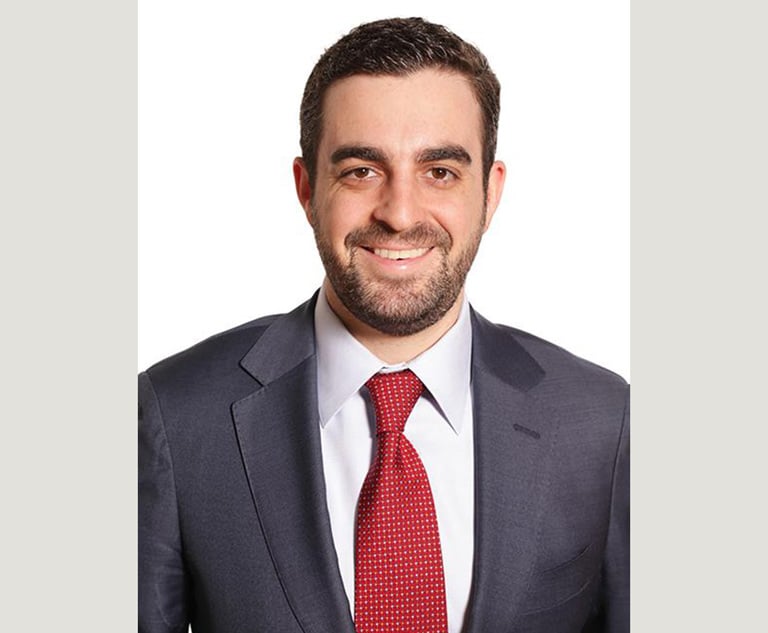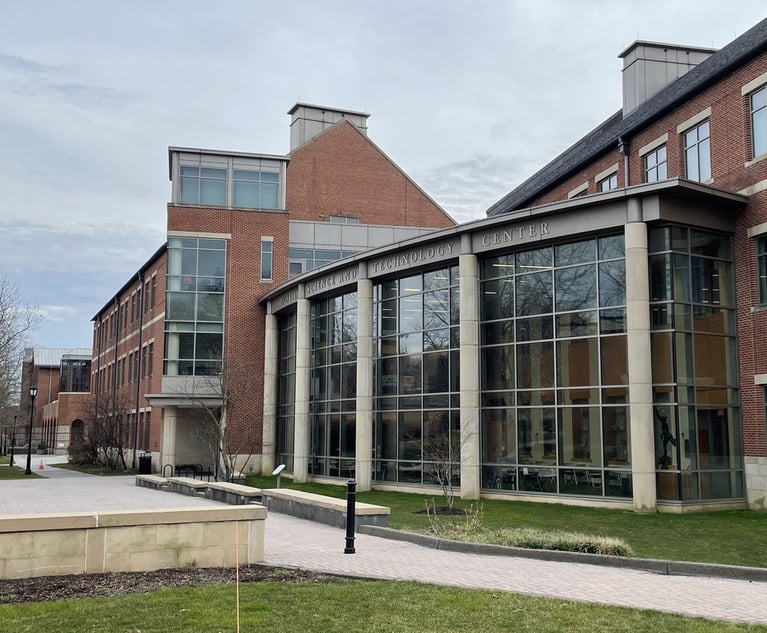 Photo: Shutterstock
Photo: ShutterstockJustices Weigh Review of Double-Jeopardy Claim in Case of Prosecution-Attributed Mistrial
Defense attorneys for Nelson Rivera Jr. and Napheace Jamal Cooper-Reid argued that, given the rights at stake, appellate courts need to be able to review double-jeopardy motions de novo.
November 20, 2019 at 01:55 PM
5 minute read
Appellate courts should be able to re-weigh evidence when reviewing double-jeopardy decisions in cases stemming from mistrials due to prosecutorial misconduct, defense attorneys argued before the Pennsylvania Supreme Court, in a session that drew a testy exchange between one justice and a deputy attorney general.
The Supreme Court heard argument Wednesday in the consolidated cases, captioned Commonwealth v. Rivera and Commonwealth v. Cooper-Reid, to determine what standard appellate courts should apply when reviewing double-jeopardy claims that arise after a case is tossed for prosecutorial misconduct.
According to court records, the defendants invoked their double-jeopardy protections after a Common Pleas Court judge granted a mistrial following repeated instances where the prosecutor failed to disclose some of the evidence it planned to use at trial, and sought to introduce evidence of text messages from a cellphone prosecutors had destroyed.
The cases hinged on a narrower set of facts, as the judge who ruled on the double-jeopardy motions was not the same judge who handled the trial. But, still Justice Kevin Dougherty took the opportunity to chastise prosecutors for minimizing the prosecutorial misconduct.
"You're supposed to be the good guy. You don't just put their head in the noose and then say. 'Oh by the way [we have information we didn't disclose],'" Dougherty said while Deputy Attorney General Christopher Schmidt was at the lectern. "I'm a former DA. I know the power of discovery."
Defense attorneys for Nelson Rivera Jr. and Napheace Jamal Cooper-Reid argued that, given the rights at stake, appellate courts need to be able to review double-jeopardy motions de novo so they can see the full scope of the alleged improprieties.
"It's too important of an issue … for the appellate courts to essentially not be able to look at the record top to bottom," defense attorney Patrick Johnson, who represented Rivera, told the justice.
Currently, caselaw in Pennsylvania says defendants must be given double-jeopardy protections when a prosecutor's misconduct resulting in a mistrial was intentional, and Clinton County Public Defender Paul Ryan, who represented Cooper-Reid, said that could be problematic.
"If all we're talking about is intent, then all the trial court needs to do is make that finding, then appellate courts are bound by that fact, and then game over," Ryan said.
Several justices, however, questioned whether the trial court, having seen the parties and attorneys first hand would be in the best position to determine whether the prosecutor's misconduct was intentional.
"There's something about seeing lawyers and the parties. It's necessary," Justice Max Baer said.
According to court records, the defendants faced numerous counts of possession with intent to deliver a controlled substance, conspiracy, and criminal use of a communication facility, along with other charges that stemmed from nearly 20 alleged sales of controlled substances between July 2014 and April 2015.
During trial, however, prosecutors allegedly failed to disclose plans to qualify an expert, failed to disclose they planned to use a PowerPoint presentation, and then subsequently altered one of the PowerPoint slides without advising the defendants. Court records said prosecutors also destroyed a cellphone containing text messages they planned to use, and that prosecutors also failed to disclose one of the defendants' inculpatory statements.
After a mistrial was granted, a second judge handled the double-jeopardy issue. Although a hearing was held, according to defense counsel, the judge also did not review a full transcript of the trial.
The prosecutor who appeared before the justices Wednesday argued that the defendants' failure to object to having a new judge rule on the double-jeopardy motion and their failure to object to the absence of the transcript indicated that the defendants' arguments needed to be waived.
However, it was this argument, plus an attempt to explain away each mistake by the prosecutor, that drew Dougherty's ire.
Schmidt, however, contended that the court's ruling shouldn't focus solely on these cases, but should provide guidance for all future instances where this might arise. Schmidt also said all state and federal courts continue to give deference to trial courts when reviewing these issues.
"It's not always that the benefit of the standard is going to be for the prosecution," he said.
At several points during the arguments the justices also suggested they may carve out a more limited set of circumstances—like in Rivera and Cooper-Reid where the judge did not oversee the trial—that would allow appellate courts to do a deeper review of the case.
"It might be that there's a rare case where the appellate court is in the same position as a second judge," Chief Justice Thomas Saylor said, concluding the argument.
This content has been archived. It is available through our partners, LexisNexis® and Bloomberg Law.
To view this content, please continue to their sites.
Not a Lexis Subscriber?
Subscribe Now
Not a Bloomberg Law Subscriber?
Subscribe Now
NOT FOR REPRINT
© 2024 ALM Global, LLC, All Rights Reserved. Request academic re-use from www.copyright.com. All other uses, submit a request to [email protected]. For more information visit Asset & Logo Licensing.
You Might Like
View All
Phila. Jury Hits Sig Sauer With $11M Verdict Over Alleged Gun Defect
3 minute read

Judge Approves $1.15M Settlement, Reduces Attorney Award in COVID-19 Tuition Reimbursement Suit
4 minute read
Dechert 'Spark Tank' Competition Encourages Firmwide Innovation Focus
Trending Stories
- 1Construction Worker Hit By Falling Concrete Settles Claims for $2.3M
- 2Phila. Jury Hits Sig Sauer With $11M Verdict Over Alleged Gun Defect
- 3Lost in the Legal Maze: How State Regulations Are Hindering Hemp Operators' Success
- 4New Associates Yearbook 2024
- 5Disbarred Attorney Alleges ADA Violations in Lawsuit Against Miami-Dade Judges
Who Got The Work
Michael G. Bongiorno, Andrew Scott Dulberg and Elizabeth E. Driscoll from Wilmer Cutler Pickering Hale and Dorr have stepped in to represent Symbotic Inc., an A.I.-enabled technology platform that focuses on increasing supply chain efficiency, and other defendants in a pending shareholder derivative lawsuit. The case, filed Oct. 2 in Massachusetts District Court by the Brown Law Firm on behalf of Stephen Austen, accuses certain officers and directors of misleading investors in regard to Symbotic's potential for margin growth by failing to disclose that the company was not equipped to timely deploy its systems or manage expenses through project delays. The case, assigned to U.S. District Judge Nathaniel M. Gorton, is 1:24-cv-12522, Austen v. Cohen et al.
Who Got The Work
Edmund Polubinski and Marie Killmond of Davis Polk & Wardwell have entered appearances for data platform software development company MongoDB and other defendants in a pending shareholder derivative lawsuit. The action, filed Oct. 7 in New York Southern District Court by the Brown Law Firm, accuses the company's directors and/or officers of falsely expressing confidence in the company’s restructuring of its sales incentive plan and downplaying the severity of decreases in its upfront commitments. The case is 1:24-cv-07594, Roy v. Ittycheria et al.
Who Got The Work
Amy O. Bruchs and Kurt F. Ellison of Michael Best & Friedrich have entered appearances for Epic Systems Corp. in a pending employment discrimination lawsuit. The suit was filed Sept. 7 in Wisconsin Western District Court by Levine Eisberner LLC and Siri & Glimstad on behalf of a project manager who claims that he was wrongfully terminated after applying for a religious exemption to the defendant's COVID-19 vaccine mandate. The case, assigned to U.S. Magistrate Judge Anita Marie Boor, is 3:24-cv-00630, Secker, Nathan v. Epic Systems Corporation.
Who Got The Work
David X. Sullivan, Thomas J. Finn and Gregory A. Hall from McCarter & English have entered appearances for Sunrun Installation Services in a pending civil rights lawsuit. The complaint was filed Sept. 4 in Connecticut District Court by attorney Robert M. Berke on behalf of former employee George Edward Steins, who was arrested and charged with employing an unregistered home improvement salesperson. The complaint alleges that had Sunrun informed the Connecticut Department of Consumer Protection that the plaintiff's employment had ended in 2017 and that he no longer held Sunrun's home improvement contractor license, he would not have been hit with charges, which were dismissed in May 2024. The case, assigned to U.S. District Judge Jeffrey A. Meyer, is 3:24-cv-01423, Steins v. Sunrun, Inc. et al.
Who Got The Work
Greenberg Traurig shareholder Joshua L. Raskin has entered an appearance for boohoo.com UK Ltd. in a pending patent infringement lawsuit. The suit, filed Sept. 3 in Texas Eastern District Court by Rozier Hardt McDonough on behalf of Alto Dynamics, asserts five patents related to an online shopping platform. The case, assigned to U.S. District Judge Rodney Gilstrap, is 2:24-cv-00719, Alto Dynamics, LLC v. boohoo.com UK Limited.
Featured Firms
Law Offices of Gary Martin Hays & Associates, P.C.
(470) 294-1674
Law Offices of Mark E. Salomone
(857) 444-6468
Smith & Hassler
(713) 739-1250





